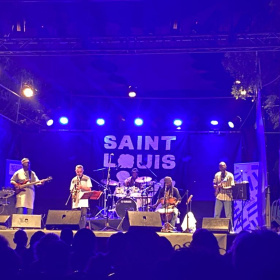Nostalgic Rockstar: Kuami Eugene recycles Ghanaian highlife
At first, Kuami Eugene’s debut album, Rockstar, delivers identical BPMs and cadences for nearly an hour.
 Kuami Eugene "nearly always wins with the chorus". Photo: LE
Kuami Eugene "nearly always wins with the chorus". Photo: LE
It appears to simply be an amalgamation of popular Ghanaian highlife refrains over time. And who can blame the artist?
That technique has proven uber-effective throughout his career, especially this year. Indeed, it is the template on which the modern Lynx sound is positioned. Music by KiDi and MzVee (his mates at the Richie Mensah-led label) over the past couple of years have been tenanted by recycled highlife expressions and melody.
If the goal is to galvanize nostalgia (as I suspect), then it works, but only for the first couple of times. Nothing wrong with influence. Influence is the ultimate form of homage, it is said. Yet, repeated too often, the approach begins to feel bland and uninventive.
On a second listen, well, little else comes up from 'Rockstar— besides his relentless recall of highlife phrases we sang along to growing up, over a dynamic production methodology. Save for 'Borkor', which is a direct homage to archetypal highlife because of the illustrious instrumentation that carries the song, the best submissions on the album have already been published as singles. 'Borkor', which preaches patience, is characterized by the glib guitar placements the genre is founded on. 'Walaahi', 'Angela', 'Wish Me Well', 'Confusion', 'Never Carry Last' (which sees guest appearances from DJ Vyrusky and Nigeria’s Mayorkun) are the most ingenious moments of the 13–tracker.
Sarkodie, known for his messiah quality on songs, can only do so much to rescue 'No More' because the song uses an overused cadence, both on the project and on Kuami Eugene’s contributions elsewhere. 'Aku Shika' may suffice as a dance floor jam, or as gym music because of its giddy rhythm, but that’s as far as it goes.
That Rockstar was curated with commercial intentions is without question. That it impresses in this regard is also without debate. Half of that repertoire, maybe more, could be considered “bangers,” mild or not, given to speedy expiry or not.
At Lynx, Kuami Eugene (born Eugene Marfo), may not be the one with the most vocal resource—today, any male act standing next to KiDi will most likely come second, and MzVee is easily the most consistent female vocalist in these parts currently. But what Eugene “lacks” in tonal swagger, he more than makes up for in grit and industry. On Ghanaian radio today, he’s omnipresent: lending guest vocals on the works of veterans and contemporaries alike, as well as dispatching songwriting duties. All through the year, at concerts, he’s remained headline material.
To many, his forte as an artist does not reside in songwriting either. Often, his writing has struck me as lacking a certain depth required of highlife in particular—a sentiment forebear Nana Tuffour echoed on Accra-based Hitz FM sometime back. Because of his rich accomplishment as a practitioner of the genre, and storytelling overall, Tuffour’s observation was especially noteworthy. But he’s a writer of love songs, and for the Ghanaian pop artist, all that is required is to bellow a lover’s first name, and the word “odo,” which translates as “love". Seeing as he is a fixture in today’s mainstream, and how sought after he is by colleagues looking to bask in his radio conquest, or oldheads looking to revamp their craft, there’s no question that he possesses a specific musical charisma.
Interesting fact: one’s misgivings about Eugene’s songwriting stop at the point where his hooks begin. Where’s the meaning in this line? Where’s the elaboration required in music professing to be highlife? Where’s the originality if from song to song he’s only cutting and pasting words and melody, be it his or a musical ancestor’s? And then, an earworm chorus comes around, thwarting all your hesitation and/or chagrin. The following is true for Ghanaian popular music: he who masters the art of the chorus wins with the song. Eugene nearly always wins with the chorus: comprising single words or single phrases, but constant in how effectively they induce recall (as seen on 'Angela', 'Confusion', 'Wish Me Well', 'Never Carry Last' etc).
Here is a departing question: Is there such a thing as an album “arriving too early?” Was Rockstar published more as a step in the quest for VGMA Artist of the Year (which he’s been widely tipped to win anyway?), to satisfy the 21-year-old’s urgent ambitions and artistic exuberance, or was it simply was considered by his handlers, appropriate topping for his best year yet?
Artist: Kuami Eugene
Album: Rockstar
Label, Year: Lynx Entertainment, 2018
A version of this review appears at ENewsGH


















Commentaires
s'identifier or register to post comments